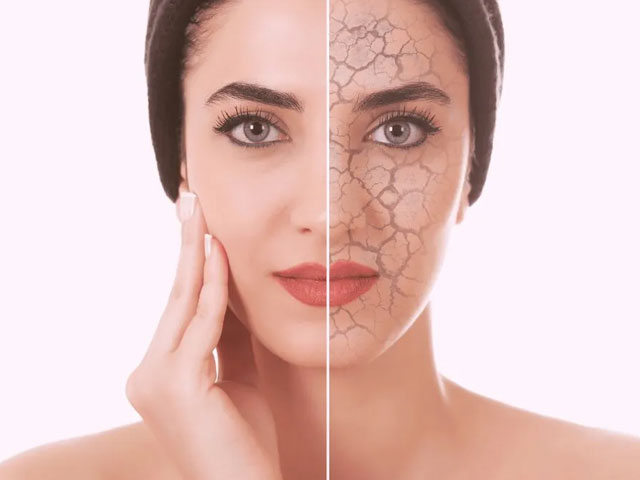
Tips and Precautions For Dry Skin
Dry skin is a very uncomfortable dermatologic problem characterized by flaking, itching, cracking and even bleeding of the skin accompanied by irregularly colored patches and ashy look. This condition can be caused by external factors, or the person may have dry skin genetically. Even those with oily skin may face this problem from time to time. The whole body does not have to be dry to talk about dry skin. In fact, it often only appears on the hands, arms or legs.
In many cases, lifestyle changes and the use of moisturizing creams are enough to solve the problem. However, in some cases, the problem may be caused by an underlying cause and may be resistant to treatment. In such cases, it is highly recommended to consult a dermatologist or the skin may age rapidly and the negative effects may become permanent.
Causes of dry skin
Exposure to dry weather, hot water and certain chemicals can immediately cause dry skin. Medical conditions can also be the cause and these cases are frequently resistant to treatments. Possible causes of dry skin include:
- Climate: Skin tends to be driest during the winter months when temperature and humidity levels drop.
- Indoor air conditioning choice: Heaters, dehumidifiers, wood stoves and fireplaces reduce humidity and dry out the skin.
- Longer showers and hotter water: Prolonged hot showers or baths can dry the skin. Swimming in heavily chlorinated pools and skipping clean water showers after swimming in sea water are also common causes of dry skin.
- Harsh soaps and detergents: Soaps, detergents and shampoos are designed to breakdown oil, which is essential to trap moisture inside the body. Therefore, these cleaning agents can cause dryness.
- Diet: Alcohol, caffeinated drinks and sugary foods makes the body lose water instantly. Drinking enough water every day is essential for the skin to retain moisture.
- Medical skin conditions: People with skin diseases such as atopic dermatitis or psoriasis are prone to dry skin.
- Medications: Some medications are reported to cause dry skin but luckily this side effect usually disappears after medication use is stopped.
Who are more prone to dry skin?
Dry skin is a condition that can occur in everyone regardless of age and sex. However, some risk factors increase the risk of developing this annoying condition:
- Age
- Genetic factors
- Profession
- Cleaning routine
- Climate
Age: Dry skin is more common in older people than in younger people. With age, skin loses some of the natural oil production ability, resulting in an increased risk. Every third person reports dry skin by thirties while half of the people over 40 do.
Genetic predisposition: Individuals with a family history of dermatologic diseases (eczema, allergic contact dermatitis or skin allergies) are more likely to develop these skin conditions and therefore more likely to suffer from dry skin.
Occupation: Dry skin is a common complaint in occupational groups with high contact with water and chemicals, such as cooks, cleaning staff and hairdressers.
Self-cleaning routine: Individuals who bathe frequently or use very hot water during showering are more likely to suffer from dry skin.
Climate: Dry skin is more common in climates with relatively low humidity levels. It is especially more common in people who spend a lot of time in cold weather for various reasons.
What is good for dry skin?
Using moisturizing products is an effective method to alleviate dry skin. Moisturizing creams, lotions or oils can maintain the moisture balance of the skin with the special ingredients they contain. Ingredients such as hyaluronic acid, glycerin and natural oils can increase the skin’s natural elasticity, thus reducing tightness. In addition, maintaining water balance within the body by paying attention to daily water consumption can also affect skin moisture levels.
To alleviate and prevent skin dryness, it is important to use moisturizer regularly. In addition, prolonged bathing with hot water should be avoided and soaps with an appropriate pH balance that gently cleanse the skin should be preferred. Using humidifiers to increase humidity levels indoors can also prevent dry skin.
It is important to take internal and external moisturizing measures to alleviate body dryness. Drinking plenty of water maintains the water balance in the body and helps moisturize the skin. It is also effective to use moisturizing lotions or oils that protect the skin against external factors. Especially in winter, skin exposed to cold and dry weather conditions may need extra care.
How to prevent dry skin?
The most important steps that can be taken to prevent the development of dry skin are simple changes in lifestyle and habits:
- Drink at least 2.5-3 liters of liquid a day
- Use moisturizer, especially after bathing
- Limit your contact with water
- Wash with warm water
- Limit the use of scrubs
- Choose mild cleansers for skin and body, and use them as little as possible
- Dress for the season
- Use protective gloves when cleaning the house
- Avoid contact with chemicals
- In case of persistent dry skin even with all precautions taken, visit a dermatologist



